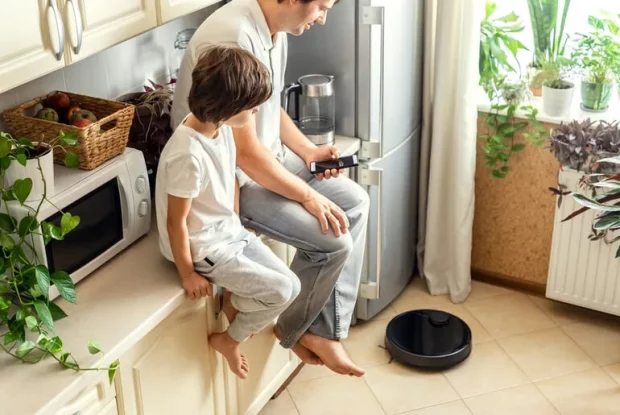Your great-grandpa did not walk five miles to school in the snow every day. The route was not uphill both ways.
But let’s be real for a minute. Your great-grandpa’s life was almost certainly a lot more difficult than yours. Your great-grandma’s, even more so.
They had a lot working against them, from now-preventable diseases — penicillin really was a miracle cure! — to death-trap automobiles to workplace safety rules that would terrify a modern HR manager.
And they also spent a lot of time doing really boring chores, like manually washing clothing and tending wood or coal fires for heat. (Yeah, seriously.)

So, if you’re feeling less than inspired by your daily routine or bummed that you have to do any busy work at all, look at the bright side. If you don’t want to, you don’t have to bother yourself with these seven menial tasks that kept your great-grandparents occupied for hours on end.
1. Sweeping
Your great-grandparents didn’t enjoy the fruits of automated labor by robotic vacuums, that’s for sure. These disc-shaped helpers now reside in tens of millions of homes around the world thanks to robotic vacuum manufacturers like Roborock, whose models make it easy to clean up dust and debris with virtually no effort.
2. Mopping
Your great-grandparents spent a lot of time mopping up after they swept too. And they didn’t use handy waterless floor mops like you probably do — to say nothing of robotic mopping devices like Roborock’s. They used those stringy, heavy things that have to be wrung out again and again.
3. Washing and Drying Clothes By Hand
Your great-grandparents almost certainly didn’t have access to a washing machine or mechanical dryer, at least not when they were younger. They used a washboard and basin to scrub their clothes clean, then hung them up on a line to dry in the sun. (And if it was too cold or wet for that, in front of the fire.)
4. Tending Fires for Heat and Cooking
If they lived in a city, your great-grandparents might have heated their home with a gas-powered boiler that warmed radiators scattered throughout the house. If they were really fancy, they had forced-air ducts connected to a gas-powered furnace.
But more likely, they used a wood- or coal-fired hearth to heat their home. Though fairly efficient by this time, these hearths (or stoves, as many call them) required regular poking, prodding, and feeding. Yes, including in the middle of the night.
5. Repairing Apparel
Fast fashion was not a thing in your great-grandparents’ day. Clothes and shoes were built to last. But they didn’t last forever, of course. When they started showing their age, out came the sewing kit.
Today, of course, we donate or throw out old clothes that have seen better days. That saves time, even if it’s not ideal for the planet.
6. Writing Letters By Hand
If you truly enjoy writing letters by hand, more power to you. But you probably find it fun because you don’t have to do it very often.
Your great-grandparents wrote more letters than you can possibly imagine. Even if they had a phone, their distant friends and relatives might not have. Writing — a time-consuming process if there ever was one — was the best way to keep in touch.
Today? Just fire off a text.
7. Raising Food for Sustenance
Many of us wouldn’t trade our vegetable gardens for the world, and they’re often a great way to save money on fresh produce. But for the vast majority of us, growing our own food is a choice. Most of our calories come from the grocery store or, increasingly, grocery delivery apps.
That wasn’t true back in the day. America was a more rural country back then, and many folks had enough space to grow a significant amount of the food they’d need throughout the year. Some kept chickens (which are making a comeback, to be fair) and other small livestock, like goats.
Tending these gardens and flocks was a lot of work — work most of us no longer have to do unless we really want to.
Getting Easier All the Time
Is it a bad thing that most people don’t know how to use a washboard?
That relatively few Americans still wash plates and bowls — to say nothing of silverware — by hand?
That sweeping up after a busy week is as easy as pushing a button on a robotic vacuum and staying out of the way for an hour or two?
Some would say that yes, it’s a bad thing, because busy work builds character. But most would say no — we’re better than busy work. If we have the tools to automate it, why should we put up with it?
Wherever you come down, chances are good you’re more productive than your parents, and certainly than your grandparents or great-grandparents. Here’s to using that extra productive capacity wisely.



